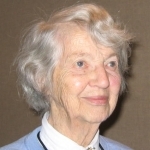 (HOST) Right now, everyone’s talking about the extreme cold, but more snow is forecast for the end of the week, and commentator Edith Hunter is thinking ahead.
(HOST) Right now, everyone’s talking about the extreme cold, but more snow is forecast for the end of the week, and commentator Edith Hunter is thinking ahead.
(HUNTER) My mother loved books. She also loved poetry.
There were three poems about snow storms, by three New England poets, that she enjoyed sharing with us.
I don’t know that she read all of John Greenleaf Whittier’s "Snow-bound" to us, it is a very long poem, but we certainly were familiar with some of the lines, especially the opening ones: "The sun that brief December day/ Rose cheerless over hills of gray/ And darkly circled gave at noon/ A sadder light than waning moon."
Son William reminds me that after an impressive snowfall here in Weathersfield, in the early 1970s, I recited some lines that occur further along in the poem, after the storm was over: "A prompt, decisive man, no breath/ Our father wasted: ‘Boys, a path." Having a "prompt and decisive" mother familiar with the poem, Will and Charles began shoveling! Graham was safely off in Texas.
The second poem my mother liked to read to us in the midst of a heavy snow fall was Ralph Waldo Emerson’s "The Snow Storm", which begins – "Announced by all the trumpets of the sky/ Arrives the snow; and driving o’er the fields,/ Seems nowhere to alight." Living in the city, as I did, we did not see the snow "driving o’er the fields", but watching the snow swirl about our house, we could well imagine it having "nowhere to alight."
And, finally, there was the sad poem, "The First Snow-Fall", by James Russell Lowell. One of his little daughters had recently died and was buried in the nearby Mount Auburn Cemetery. The poem begins: "The snow had begun in the gloaming,/ And busily all the night/ Had been heaping field and highway/ With a silence deep and white."
A few verses later, the poet continues: "I thought of a mound in sweet Auburn/ Where a little headstone stood;/ How the flakes were folding it gently,/ As did robins the babes in the wood." The poem made a deep impression on me.
I found all three of these poems in a collection that Will picked up for me at a second hand book sale. It is called "Library of World Poetry", "fifteen hundred selections from more than four hundred authors", gathered in 1870 by the poet William Cullen Bryant.
When lines from these poems come to mind, I am always reminded of this little poem –
"You may have tangible wealth untold;
Caskets of jewels and coffers of gold.
Richer than I you can never be –
I had a mother who read to me."